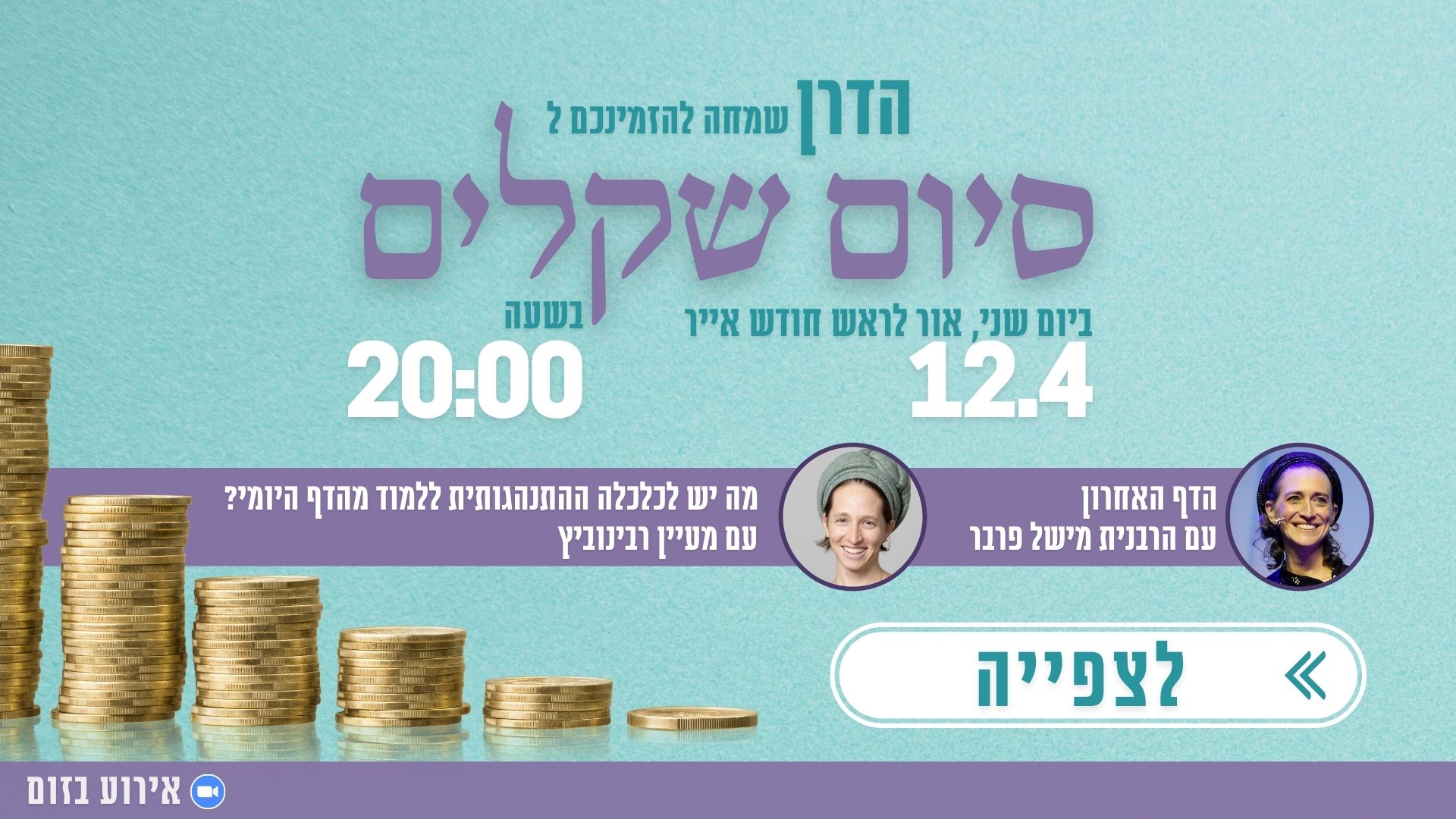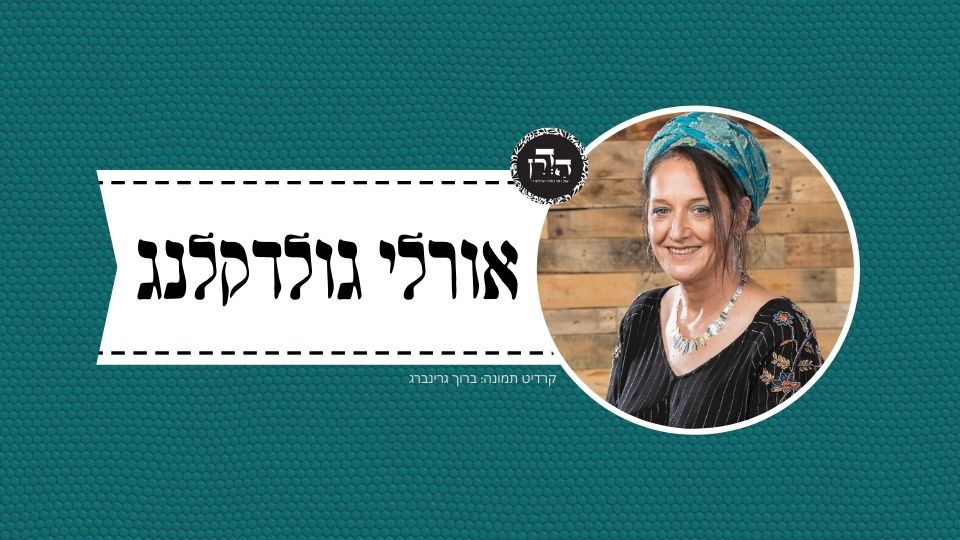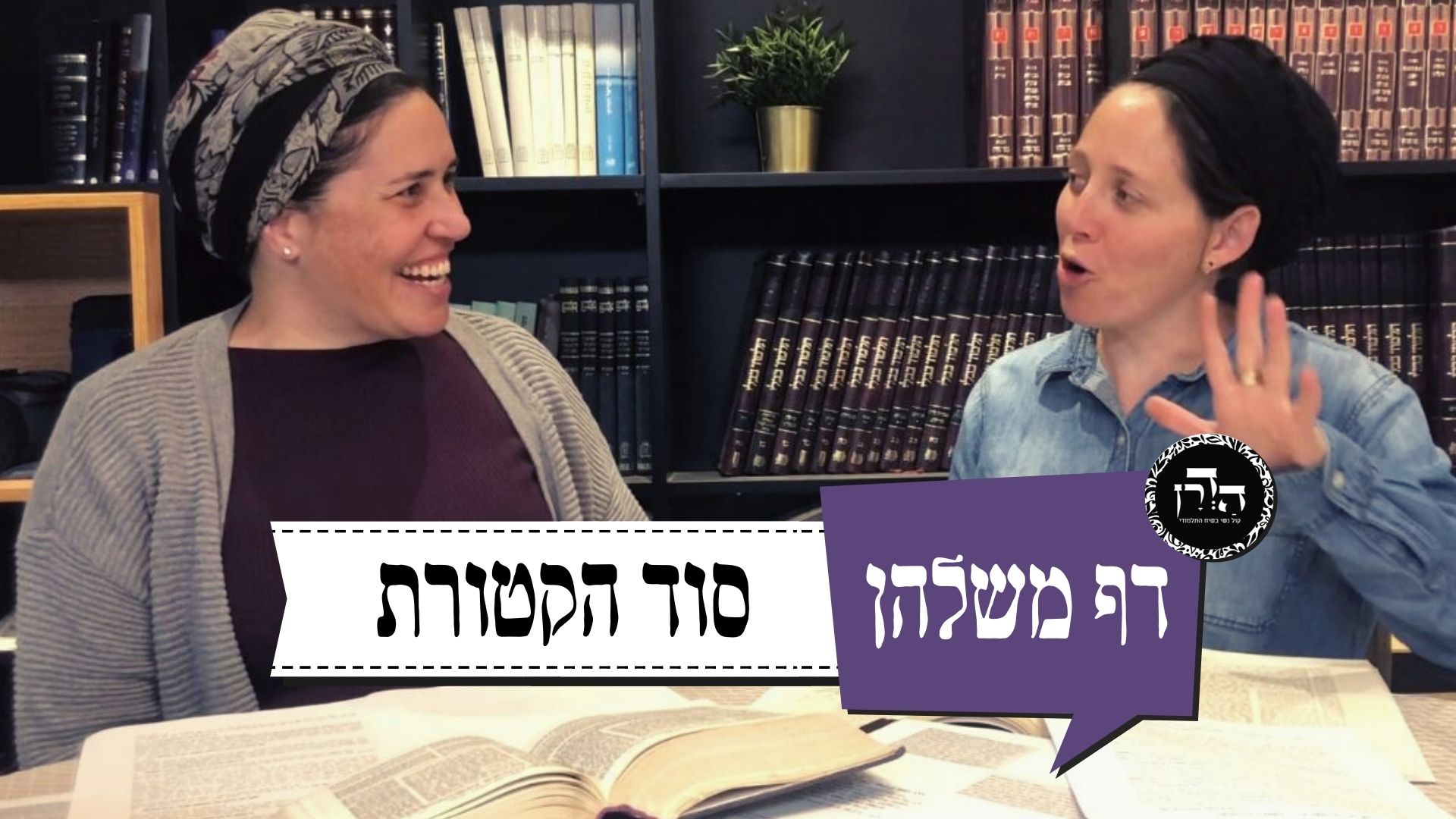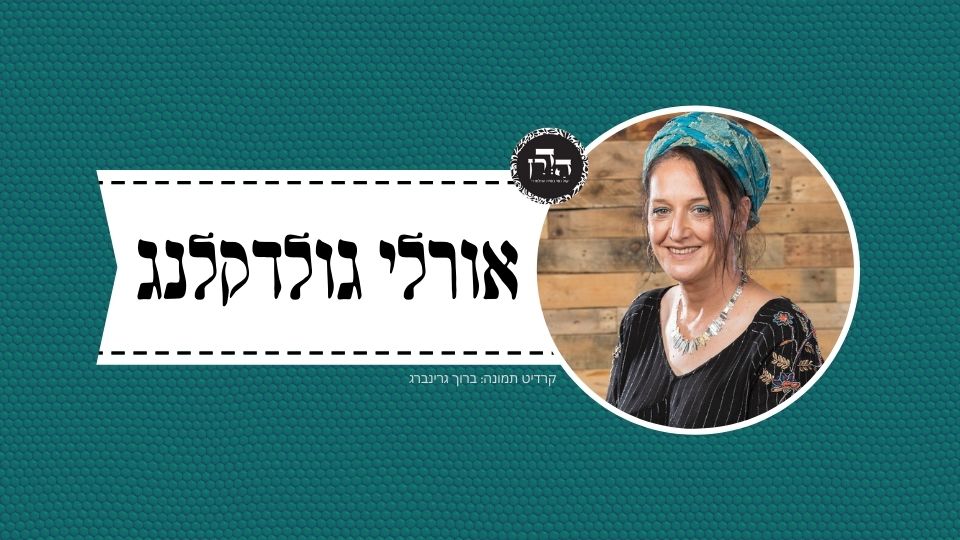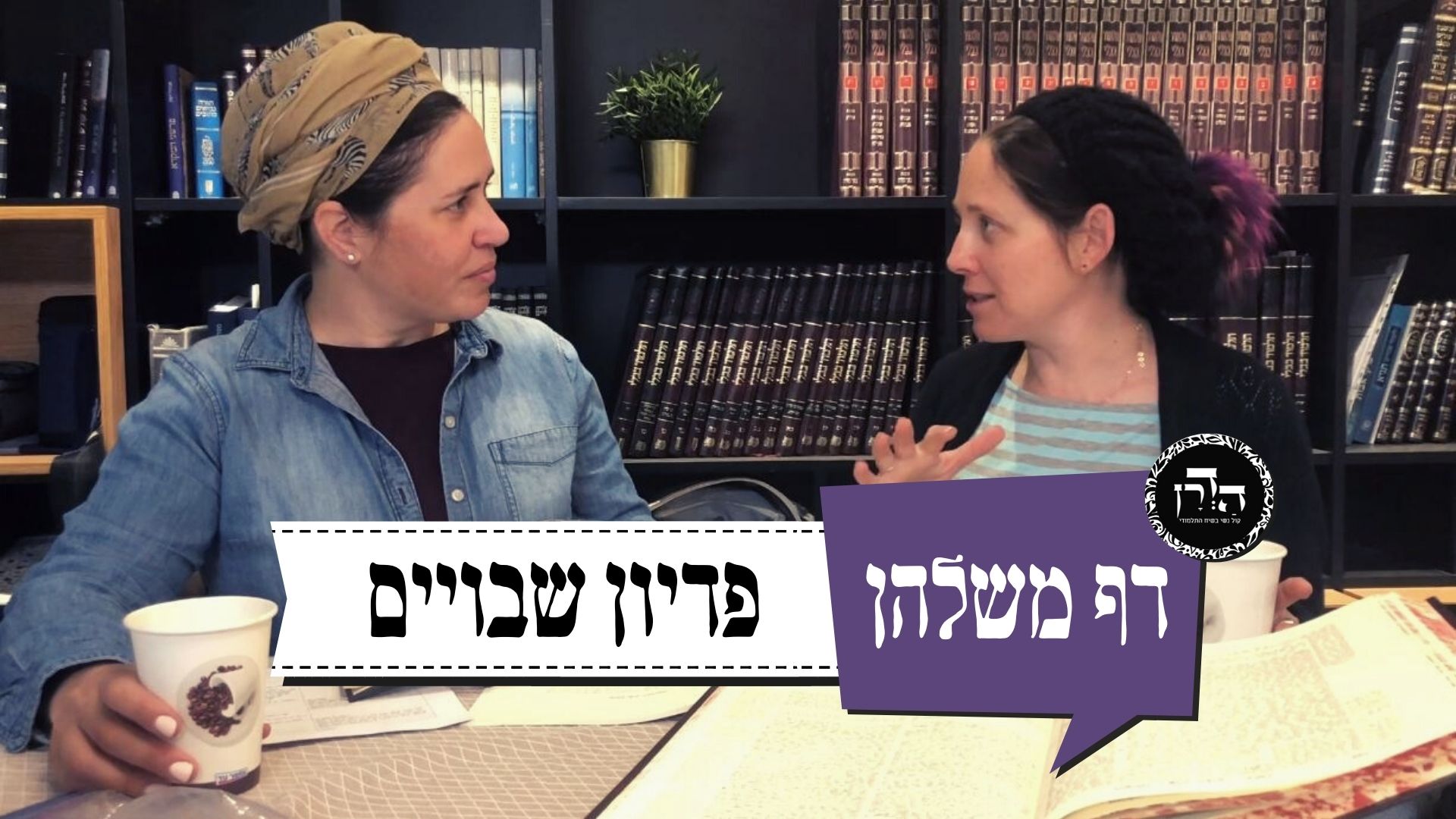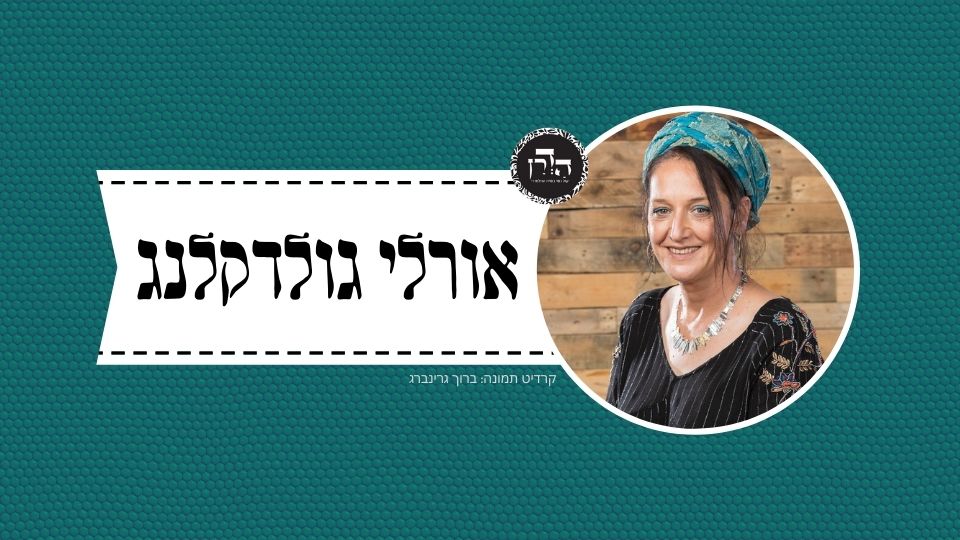שקלים ג
בִּשְׁלשָׁה פְּרָקִים בַּשָּׁנָה, תּוֹרְמִין אֶת הַלִּשְׁכָּה, בִּפְרוֹס הַפֶּסַח, בִּפְרוֹס עֲצֶרֶת, בִּפְרוֹס הֶחָג, וְהֵן גְּרָנוֹת לְמַעְשַׂר בְּהֵמָה, דִּבְרֵי רַבִּי עֲקִיבָא. בֶּן עַזַּאי אוֹמֵר, בְּעֶשְׂרִים וְתִשְׁעָה בַּאֲדָר, וּבְאֶחָד בְּסִיוָן, וּבְעֶשְׂרִים וְתִשְׁעָה בְּאָב. רַבִּי אֶלְעָזָר וְרַבִּי שִׁמְעוֹן אוֹמְרִים, בְּאֶחָד בְּנִיסָן, בְּאֶחָד בְּסִיוָן, בְּעֶשְׂרִים וְתִשְׁעָה בֶּאֱלוּל. מִפְּנֵי מָה אָמְרוּ בְּעֶשְׂרִים וְתִשְׁעָה בֶּאֱלוּל, וְלֹא אָמְרוּ בְּאֶחָד בְּתִשְׁרֵי, מִפְּנֵי שֶׁהוּא יוֹם טוֹב, וְאִי אֶפְשָׁר לְעַשֵּׂר בְּיוֹם טוֹב, לְפִיכָךְ הִקְדִּימוּהוּ לְעֶשְׂרִים וְתִשְׁעָה בֶּאֱלוּל:
On three occasions during the year the ceremony of the collection of the Temple treasury chamber is performed. During the ceremony, a priest enters the treasury chamber with three containers, lifts up [torem] some of the coins, and places them in the containers. These funds, known as the collection of the chamber, are used to purchase animals for communal offerings and other needs of the Temple. These three occasions are: Half a month, fifteen days, before Passover, on the day before the first of the month of Nisan; half a month before Shavuot, on or around the twentieth of Iyar; half a month before the festival of Sukkot, on the day before Rosh HaShana. These three days are also the due dates that were established by the Sages for the setting aside of animal tithes. On each of these days one is obligated to tithe the animals that were born during the intervening period, and it is prohibited for him to eat or sell them until he does so. This is the statement of Rabbi Akiva. Ben Azzai says that the dates established by the Sages for the setting aside of animal tithes are the twenty-ninth of Adar, the first of Sivan, and the twenty-ninth of Av. Rabbi Elazar and Rabbi Shimon say that the dates for the animal tithes are the first of Nisan, the first of Sivan, and the twenty-ninth of Elul. And why did Rabbi Elazar and Rabbi Shimon say the twenty-ninth of Elul and not the first of Tishrei, as they said the first of Nisan and Sivan? Because the first of Tishrei is the festival of Rosh HaShana, and it is not permitted to tithe on a Festival. Therefore, the Sages advanced the day of tithing the animals born over the course of the summer to the twenty-ninth of Elul.
בְּשָׁלשׁ קֻפּוֹת שֶׁל שָׁלשׁ שָׁלשׁ סְאִין תּוֹרְמִין אֶת הַלִּשְׁכָּה, וְכָתוּב בָּהֶן אָל”ף בֵי”ת גִימ”ל. רַבִּי יִשְׁמָעֵאל אוֹמֵר, יְוָנִית כָּתוּב בָּהֶן אָלפ”א בֵית”א גָמל”א. אֵין הַתּוֹרֵם נִכְנָס לֹא בְּפַרְגּוֹד חָפוּת, וְלֹא בְּמִנְעָל, וְלֹא בְּסַנְדָּל, וְלֹא בִּתְפִלִּין, וְלֹא בְּקָמִיעַ, שֶׁמָּא יַעֲנִי, וְיֹאמְרוּ מֵעֲוֹן הַלִּשְׁכָּה הֶעֱנִי, אוֹ שֶׁמָּא יַעֲשִׁיר, וְיֹאמְרוּ מִתְּרוּמַת הַלִּשְׁכָּה הֶעֱשִׁיר. לְפִי שֶׁאָדָם צָרִיךְ לָצֵאת יְדֵי הַבְּרִיּוֹת כְּדֶרֶךְ שֶׁצָּרִיךְ לָצֵאת יְדֵי הַמָּקוֹם, שְׁנֶּאֱמַר (במדבר לב) וִהְיִיתֶם נְקִיִים מֵיְיָ וּמִיִּשְׂרָאֵל, וְאוֹמֵר (משלי ג) וּמְצָא חֵן וְשֵׂכֶל טוֹב בְּעֵינֵי אֱלֹהִים וְאָדָם:
The funds are collected from the Temple treasury chamber with three baskets, each measuring three se’a. On the baskets is written, respectively, alef, beit, gimmel, based on the order in which the baskets are filled, to indicate from which basket coins should be taken to buy sacrifices. The coins were used in the order of their collection. Rabbi Yishmael says: The letters written on them were in Greek, alfa, beta, gamma. The one who collects the funds from the chamber must not enter while wearing a cuffed garment [ḥafut], and not with a shoe, and not with a sandal, and not with phylacteries, and not with an amulet, since all of these have places into which money can be inserted. The concern is that perhaps the one collecting the funds will one day become poor, and people will say that it is because of the sin of stealing the shekels of the chamber that he became poor, as they will suspect that he stole money and hid it in those places. Or perhaps he will become rich and people will say that he became rich from stealing the funds of the chamber, even though he did not actually do so. Even though one should not suspect someone of stealing consecrated shekels, the one collecting the funds from the chamber must nevertheless take these precautions, as a person must appear justified before people just as he must appear justified before the Omnipresent [HaMakom], and it is stated: “And you shall be guiltless before the Lord and before Israel” (Numbers 32:22). From here it may be inferred that it is not enough to be innocent before God; one must also be innocent before the Jewish people. Even in situations where there is little concern that one may commit a sin, the proper course is to remain above any possible suspicion of misconduct. And the verse states: “So shall you find grace and good understanding in the sight of God and man” (Proverbs 3:4).
שֶׁל בֵּית רַבָּן גַּמְלִיאֵל (הָיָה) נִכְנָס וְשִׁקְלוֹ בֵּין אֶצְבְּעוֹתָיו, וְזוֹרְקוֹ לִפְנֵי הַתּוֹרֵם, וְהַתּוֹרֵם מִתְכַּוֵּן וְדוֹחֲקוֹ לַקֻּפָּה. אֵין הַתּוֹרֵם תּוֹרֵם עַד שֶׁיֹּאמַר לָהֶם, אֶתְרֹם. וְהֵן אוֹמְרִים לוֹ, תְּרֹם, תְּרֹם, תְּרֹם, שָׁלשׁ פְּעָמִים:
In order to indicate the importance that was attached to the ceremony of the collection of the Temple treasury chamber, the mishna relates that the members of the house of Rabban Gamliel desired that their shekels be the ones collected from the chamber and used for the purchase of the communal offerings. Each of them would therefore come to the Temple specifically on the day of the ceremony of the collection of the chamber, enter the chamber with his shekel between his fingers, and toss it in front of the one collecting the money so that he would see it and place it in the basket containing the money to be taken out of the chamber. Understanding what was happening, the one collecting the money from the chamber would purposely push this shekel into the basket, so that it would later be used to buy communal offerings. The one collecting the funds from the chamber may not begin to collect the money until he asks the Temple treasurers three times: Shall I collect the funds, and they say to him: Collect them, collect them, collect them, three times.
תָּרַם אֶת הָרִאשׁוֹנָה וּמְחַפֶּה בִּקְטַבְלָאוֹת, שְׁנִיָּה וּמְחַפֶּה בִּקְטַבְלָאוֹת. שְׁלִישִׁית לֹא הָיָה מְחַפֶּה, שֶׁמָּא יִשְׁכַּח וְיִתְרֹם מִן הַדָּבָר הַתָּרוּם. תָּרַם אֶת הָרִאשׁוֹנָה לְשֵׁם אֶרֶץ יִשְׂרָאֵל, וּשְׁנִיָּה לְשׁוּם כְּרַכִין הַמֻּקָּפִין לָהּ, וְהַשְּׁלִישִׁית לְשׁוּם בָּבֶל וּלְשׁוּם מָדַי וּלְשׁוּם מְדִינוֹת הָרְחוֹקוֹת:
The coins were stored in the Temple treasury in three large baskets, each measuring nine se’a. In the collection of the chamber ceremony, coins were removed from these baskets and placed in smaller baskets of three se’a each that were marked with letters (see the previous mishna on daf 8a). After he collected the funds from the first large basket and put them into one of the smaller baskets labeled with the letter alef, he immediately covered with a leather cover the large basket from which he had removed the money. After collecting funds from the second large basket, he covered it with a leather cover as well. But after collecting funds from the third large basket, he did not cover it. The mishna asks: Why did he cover the first two baskets? In order to mark them as already having had funds collected from them. In this way, there was no concern that perhaps he would forget and once again collect funds from a basket from which funds had already been collected. The mishna specifies the intent of the one collecting the funds from the baskets as he does so: He collected funds from the first basket on behalf of the people living in Eretz Yisrael; from the second basket on behalf of the people living in the cities near Eretz Yisrael; and from the third basket on behalf of the people living in Babylonia, and on behalf of the people living in Media, and on behalf of the people living in the distant countries.

